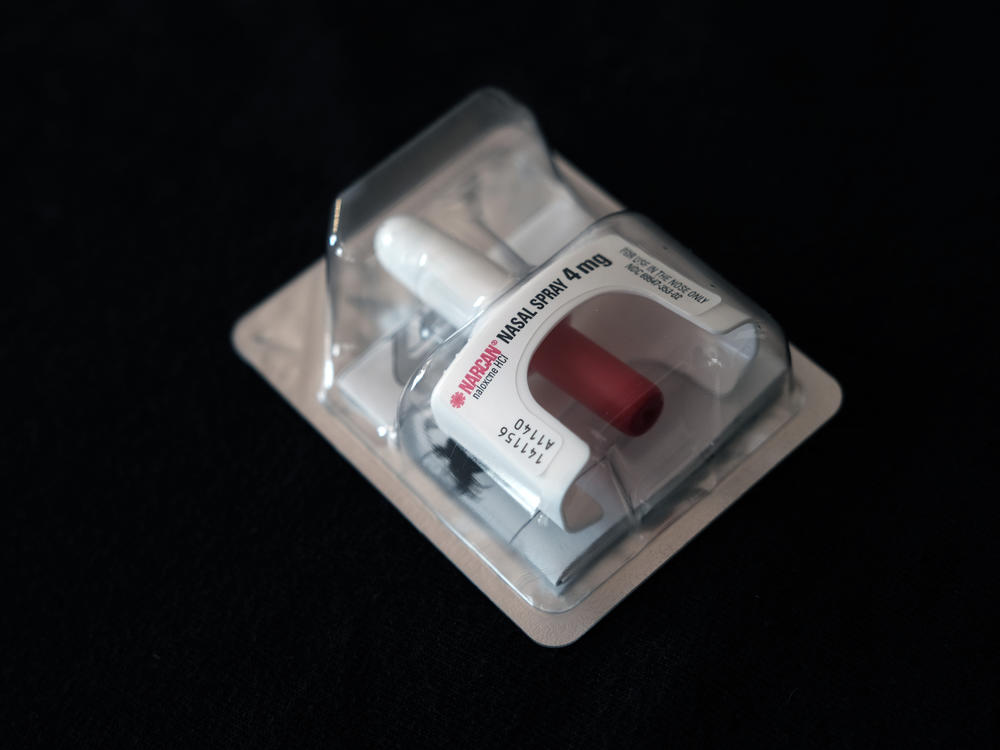Section Branding
Header Content
Over-the-counter Narcan will save lives, experts say. But the cost will affect access
Primary Content
A drug used to reverse opioid overdoses could soon be sold over the counter.
A committee of advisers to the Food and Drug Administration this week voted unanimously in favor of making Narcan, a nasal-spray version of the generic drug naloxone, available without a prescription.
The FDA is weighing the move after fast-tracking an application from Emergent BioSolutions, the maker of Narcan, to let it sell the drug over the counter.
The medication is a key tool in preventing opioid-related overdose deaths, which have climbed in recent years, due in large part to the spread of fentanyl. More than 80,000 people died of overdoses involving opioids in 2021, a historic high, according to the Centers for Disease Control and Prevention.
Experts say naloxone is a safe, effective, easy-to-use medicine that works if administered within the first few minutes of an overdose, with no potential for abuse. The medication works by binding to the same receptors in the brain as opioids, countering their effects.
The advisory panel said doing away with prescriptions for Narcan will save lives.
"For the sake of the public and saving lives, I believe this medication should be available over the counter to the public as soon as possible," said Dr. Katalin Roth, a professor of medicine at the George Washington University School of Medicine & Health Sciences, after Wednesday's panel vote.
The FDA plans to make a decision by the end of March.
The cost of the life-saving drug could affect whether Narcan going over the counter is indeed accessible
Making Narcan more widely available is an important step in addressing the opioid overdose crisis, public health experts say, but that ultimately the cost of an over-the-counter Narcan product will determine how many people actually benefit from it.
"For people who can afford the formulations of Narcan that are advancing towards over-the-counter status, I think this is a step forward to naloxone access," said Dr. Brian Hurley, an addiction physician and president-elect of the American Society of Addiction Medicine. "Having additional pathways for people to be able to reverse opioid overdose is important."
In many parts of the country, Narcan is already readily available, no individual prescription needed, thanks to workarounds that include standing prescription orders made by public health officials in every state. The policy changes have put the antidote into the hands of more first responders and community distributors.
But naloxone's prescription-only status still creates regulatory hurdles that can make the drug difficult to get.
In Alabama, for example, only pharmacists and some licensed physicians are allowed to distribute naloxone. Such restrictions can create challenges for smaller organizations, like harm-reduction groups that buy the medication in bulk for community distribution. That's where over-the-counter Narcan could make a big difference, said Maya Doe-Simkins, co-director of the Remedy Alliance, a nonprofit naloxone distributor.
"Are the regulatory barriers costing lives? Absolutely," she said.
Hurley, the addiction specialist, said if the FDA drops the prescription requirement, that also means people who can afford the product can walk into a pharmacy without worrying about whether the pharmacists there have completed the training required to distribute Narcan.
But, he added, nonprescription Narcan won't support some of the existing efforts — like grant-funded harm-reduction naloxone distribution programs and standing prescription orders from public health officials — that work to get the medication to many communities on the frontlines of the opioid overdose crisis.
"What this won't do is solve the problem of getting naloxone to under-resourced individuals and families in communities, where the risk of overdose is highest, because they have to go in and pay for it," he said.
Emergent BioSolutions CEO Bob Kramer previously told NPR that his goal is to get the drug into more hands so that people have it when they need it.
A spokesperson for the drugmaker said it's too early in the approval process to comment on pricing.
Hurley said current market price can cost around 20 times as much as other naloxone products.
A naloxone product making progress in the over-the-counter approval process shows social change, an advocate says
Advocates hope that an FDA approval for nonprescription Narcan will open door for regulatory switches on cheaper, more widely used generic alternatives. The federal agency has also fast-tracked its over-the-counter approval review for another naloxone nasal spray, an inexpensive formulation from the nonprofit Harm Reduction Therapeutics. An advisory panel for that drug, RiVive, will convene on Monday.
The fact that any naloxone product has cleared a major hurdle in the FDA's over-the-counter approval process represents social progress, according to Sarah Evans, the division director of drug policy at the Open Society Foundations.
Prioritizing a medication that can save lives, she said, helps chip away at the stigma people who use drugs often face — stereotypes that can lead to discrimination against communities and distract from efforts to confront the crisis.
"It means we're starting to get past stigma itself, a driver of the overdose crisis, and starting to really address the fact that there are some solutions that are within our grasp," she said. "We're not helpless in the face of this crisis."
Copyright 2023 NPR. To see more, visit https://www.npr.org.

